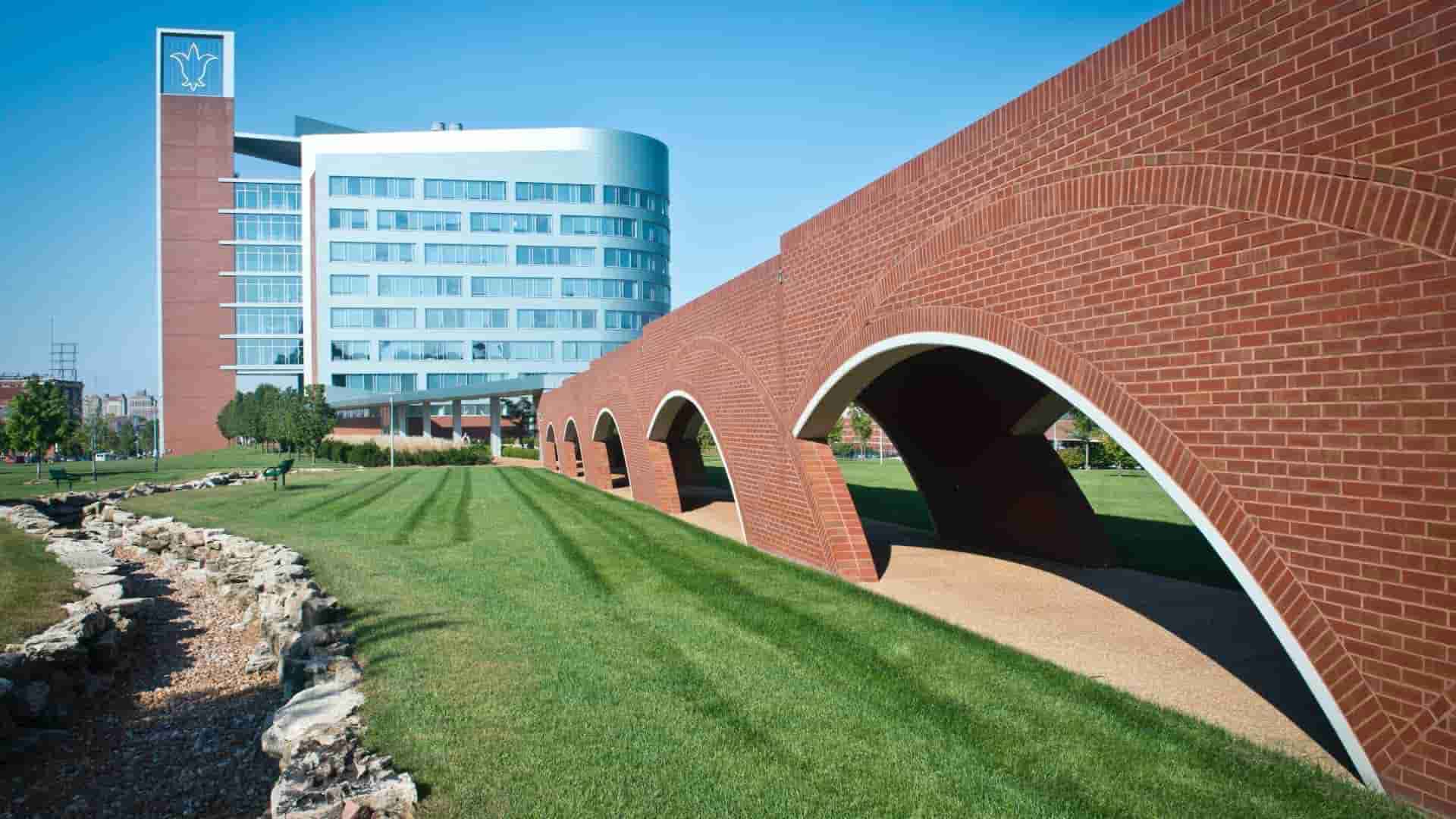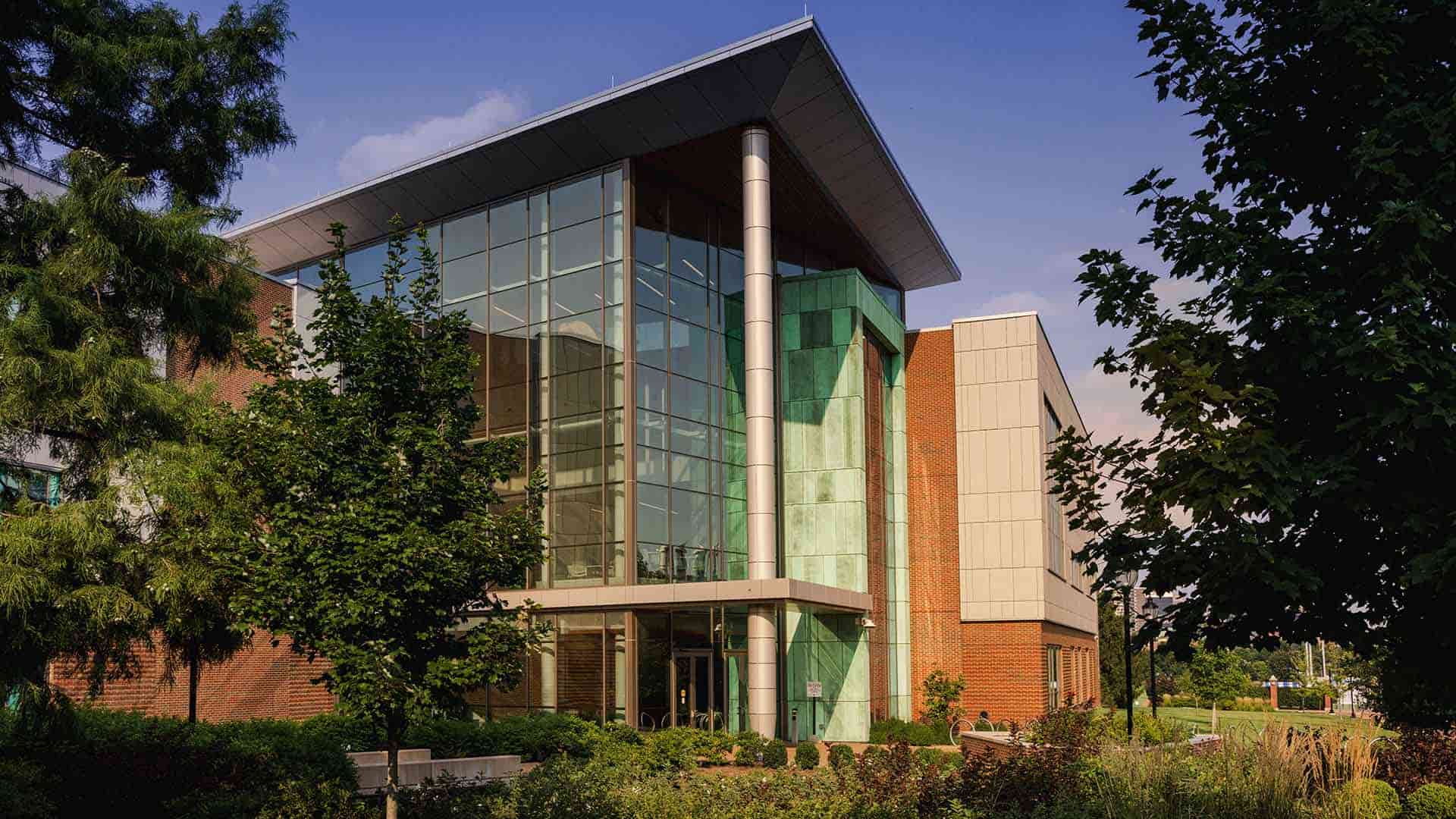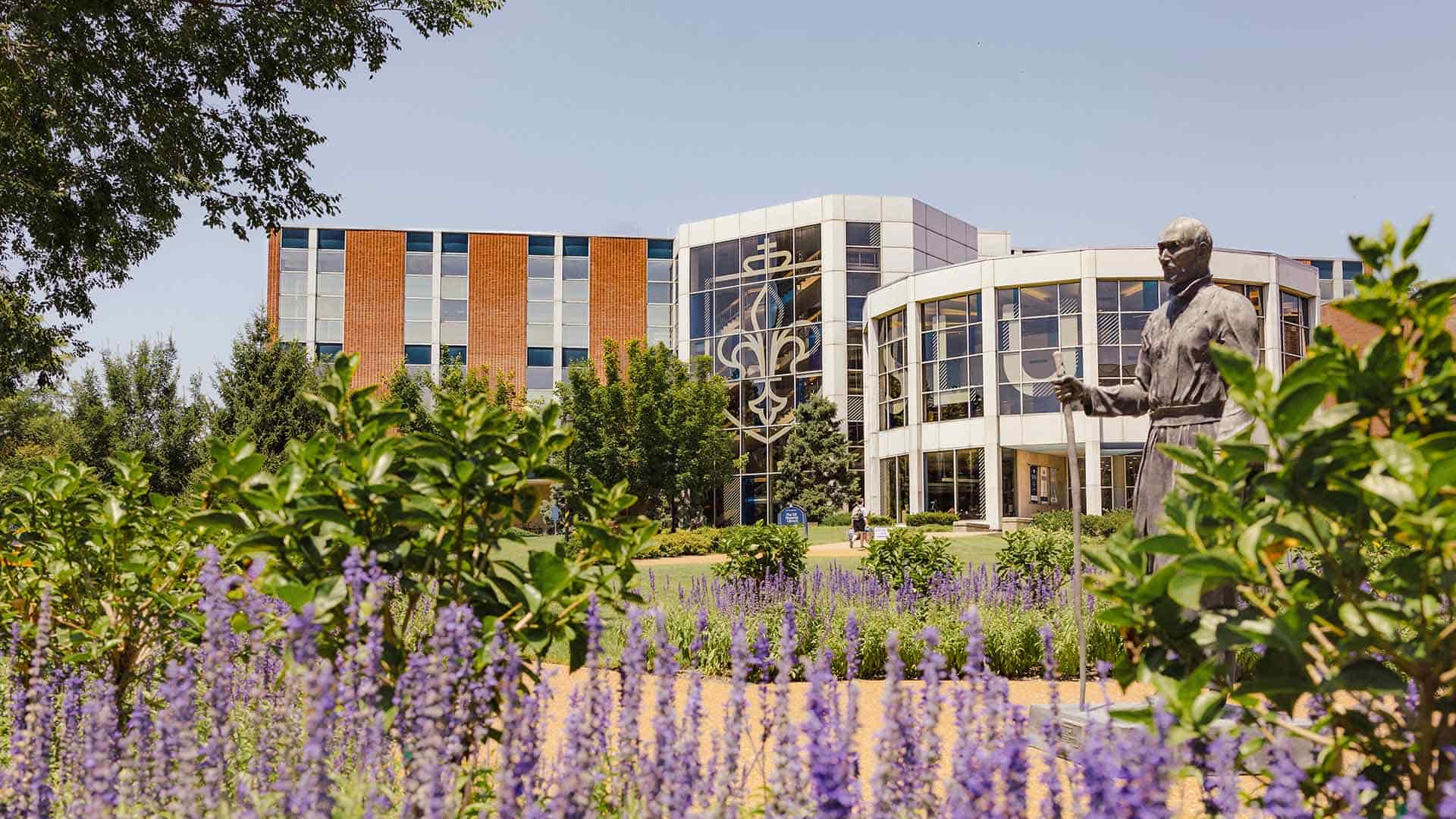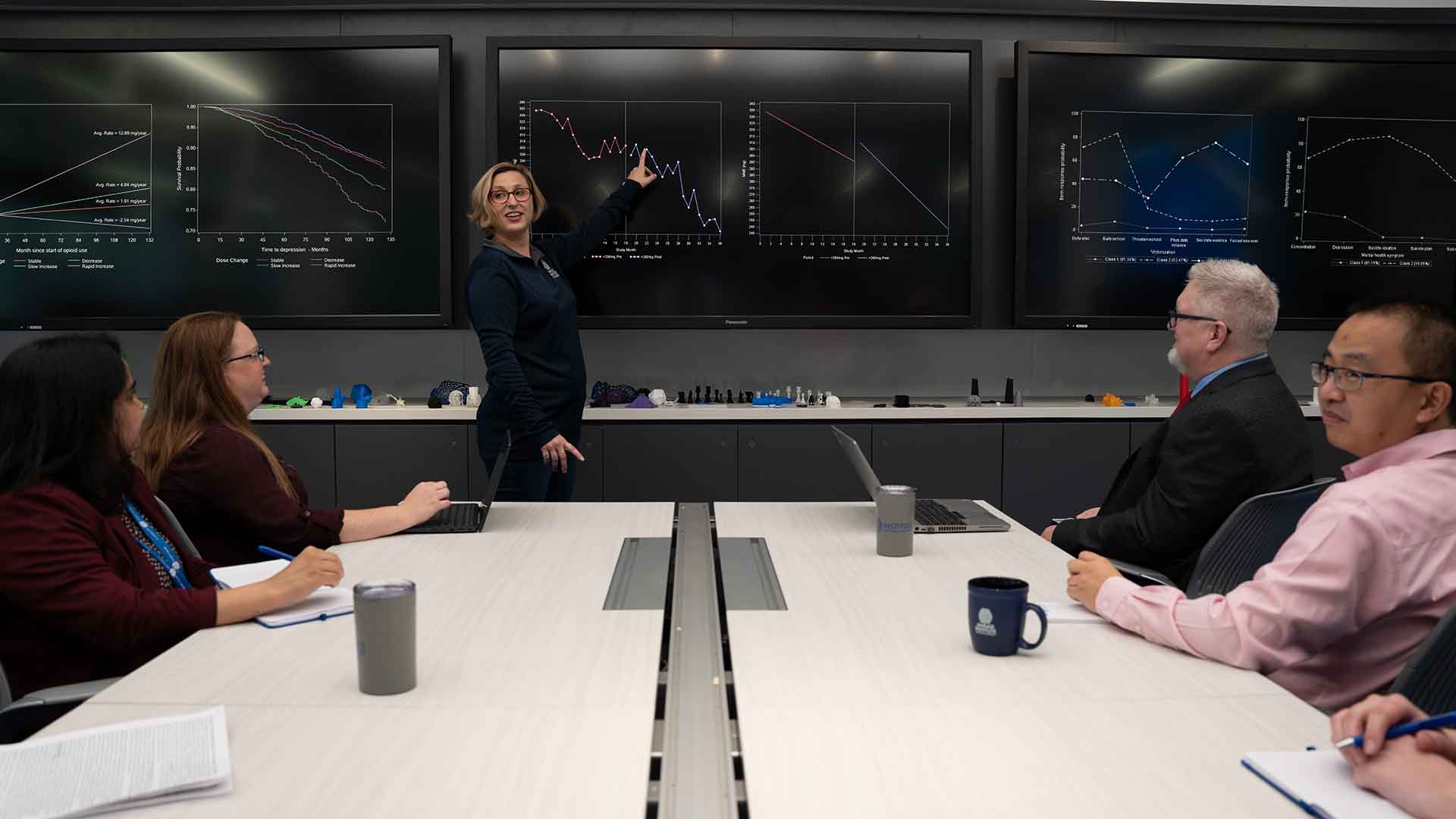Facilities
Saint Louis University is home to world-class researchers — and world-class facilities to match. With nearly half a million square feet of dedicated research space, SLU is an ideal place for researchers to pursue their greatest research ambitions.
Medicine and Health
SLU’s state-of-the-art facilities allow researchers in medicine and the health sciences to advance their understanding of the mechanisms of disease and develop effective new treatments. Below is a small sample of these facilities that enable breakthroughs in a range of fields, from cancer research to vaccine development.
The Edward A. Doisy Research Center
The Edward A. Doisy Research Center is home to many of the University’s medical and health research centers, such as the SLU Center for Vaccine Development. With eight floors of lab and research space, the Doisy Research Center allows teams to work closely together in critical areas such as cancer research and vaccine development, collaborating on breakthroughs in treatment and patient care.
Additional Facilities
- The College for Public Health and Social Justice moved into a newly renovated space in January 2025, bringing students and faculty together under one roof to promote teaching and research that advanced public health. The renovations were funded by a $4 million grant from the Health Resources and Services Administration, the first-ever Congressionally Directed Spending-Construction Award to SLU.
- Flow cytometry allows measurements of various phenotypic, biochemical and molecular characteristics of individual cells (or particles) suspended in a fluid stream. The Flow Cytometry Research Core Facility is equipped with seven flow cytometry analysis and sorting instruments operated by highly trained and knowledgeable operators. This is a crucial component of the research infrastructure whose analytical services provide critical end-point experimental data collection, while cell sorting is an indispensable experimental entry-point for many research projects. Contact flowcore@health.slu.edu for more information.
- The Genomics and Bioinformatics Core Facility offers primarily single cell genomics library preparation services and both bulk and single cell genomics-based bioinformatics services to both internal and external users. The goal of the Core is to make genomics-based projects easy and accessible to all labs, regardless of prior experience with genome-wide research. For an initial consultation, please contact Michelle Brennan at michelle.pherson@health.slu.edu.
- The Protein Core Facility is a shared-use core facility that supports expression, purification and analysis of reagent and preclinical proteins.
Science and Engineering
SLU researchers examine the natural world in order to develop better infrastructure and technology for humanity. Below is a sample of the facilities at SLU that allow researchers to collect and analyze data and design the technologies that will transform tomorrow.
Sinquefield Science and Engineering Center
Opened in 2020, the Sinquefield Science and Engineering Center features innovative teaching environments and flexible lab spaces that allow students to get hands-on research experience in the classroom. The facility includes more than 10,000 square feet of dedicated research space and is home to several interdisciplinary research centers that study a variety of issues, from additive manufacturing to the digital humanities.
Additional Facilities
- Located in the Sinquefield Science and Engineering Center, the SLU Center for Additive Manufacturing (SLU CAM) provides additive manufacturing resources including 3D printing, computer-aided design and related activities to researchers and the St. Louis community at large.
- Located in the Sinquefield Science and Engineering Center, the Water Access, Technology, Environment, and Resources (WATER) Institute advances water innovation to serve humanity. Services provided by the Institute include: hydraulics, hydrology, and sediment transport analysis; drinking water quality analysis; environmental science and geochemistry analysis; geotechnical analysis, community engagement, and computer and computational resources.
- Located in Pius XII Memorial Library, the Academic Tech Commons is a creator space designed to promote technological advancements and innovation, giving patrons access to state-of-the-art recording studios, 3D printers, 360 cameras and hologram technology.
Humanities, Social Sciences and the Arts
The following facilities at SLU provide researchers and scholars in the humanities, the social sciences, and the arts with a window into the richness and complexity of human experience across different places and time, enabling them to better understand our world and chart a brighter future for all.
University Libraries
The University Libraries support faculty and student research with top-level librarians and access to millions of physical and digital volumes, ensuring researchers have access to foundational texts and the latest literature in their field. SLU has three libraries on its St. Louis campus and one on its campus in Madrid, Spain.
University Libraries include specialized collections, such as the Knights of Columbus Vatican Film Library, an asset for medieval and Renaissance manuscript studies that houses more than 37,000 microfilmed manuscripts from the Biblioteca Apostolica Vaticana.
In 2024, SLU Libraries joined the Center for Research Libraries, an international consortium of more than 200 research libraries that allows member institutions to share unique resources.
Additional Facilities
- The Saint Louis University Museum of Art (SLUMA) exhibits works by modern masters and displays an extensive collection of Jesuit artworks and artifacts. SLUMA has been recognized by Architectural Digest and the Huffington Post as one of the country’s best university art museums.
- A rare example of Richardsonian Romanesque architecture in St. Louis, the Historic Samuel Cupples House and Gallery serves as a gallery for the University’s collection of fine and decorative art dating before 1919. The house was built in 1888 and placed on the National Historic Register in 1976.
Data and Software Services
SLU is home to several research centers that collect and review specialized data, maintain large databases, and develop software solutions to support research projects.
- The Advanced HEAlth Data (AHEAD) Research Institute conducts data-driven research to improve the health of individuals and populations. Through collaborations with national research networks, the institute develops and manages data resources to provide multiple data sets that meet the needs of individual researchers. The AHEAD Institute can assist with: study design, survey design, REDCap project design and implementation, qualitative study design and analysis, and selection of appropriate data sources.
- The Biostatistics Core (within AHEAD): Provides data-driven innovation and research to improve the health of individuals and populations. Service scope involves data acquisition and data management, sample size calculations and statistical plans for grant preparation, and statistical analyses. Contact ahead@health.slu.edu for more information.
- The Research Computing Group (RCG) supports researchers across campus by helping them access and effectively use the computing resources they need for their work. The team provides consulting on research computing needs beyond standard desktops. RCG also provides access to cloud-based computing environments, and manages and supports high-performance computing (HPC) clusters. All researchers, research units, faculty and staff can have access to these resources. For assistance, please contact Maureen Donlin, director of the Research Computing Group, at maureen.donlin@health.slu.edu or Shurthi Sreenivasa Murthy, assistant director of the Research Computing Group, at shruthi.sreenivasamurthy@health.slu.edu.
- Open Source with SLU provides software development services, building solutions for researchers and external clients. Through these projects, student developers gain professional experience that bridges academic learning and industry readiness. The program also offers consulting and development services that advance open science good practices. This consulting includes individual consults, short-term lab embedding, and focused workshops covering data management, publishing, teaching, and software.
- The Remote Sensing Lab offers a range of geospatial services such as access to satellite and drone data, mobility data, collection of custom data in the field, access to high-performance computing, and general GIS tasks.
- The Sinquefield Center for Applied Economic Research (SCAER) brings together scholars throughout SLU who share a common interest in applied social and economic research. The Center has access to Deweydata, which allows research access to datasets from over 30 providers that contain rich and detailed information on business activity, property values, and individual mobility. For example, Safegraph, which is only available on the Dewey platform, provides aggregated data on mobility, and has been used in over 500 academic studies. The center is funded by a generous gift from Dr. Jeanne and Rex Sinquefield.





















